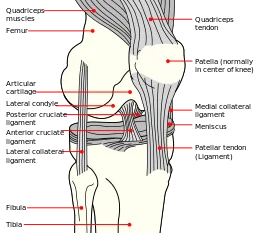In each knee, we have a menisci. (Plural: meniscus) We don’t think of these C-shaped rubbery disks much until they cause us problems. The menisci disperse our body weight which keeps our knees steady and our bodies balanced. So when they start to give us problems, our entire life can be turned upside down. It’s only then we realize how much we depend on the knee meniscus.
Meniscus tears in the knees often occur in athletes bodies. Sports that require pivoting, turning, or squatting like basketball, soccer, tennis and football can cause this type of injury.
In the case of personal injury victims, often it is direct pressure or forced contact with another solid object directly to the knee that causes this injury. Since the meniscus loses strength as we age, the meniscus in people over the age of 30 become more susceptible to injury when their knees are exposed to direct pressure or force. This injury can occur in slip and falls. If a person was in an auto accident and their knee was slammed into the dashboard, steering wheel or door of their car upon impact, this forced pressured can cause a meniscus tear. Motorcycle riders who fall off their bikes or fly into other objects where they strike their knees at a high rate of speed may also experience this injury.
Initially, a person may experience pain and swelling. The swelling may not occur all at once but rather can present gradually. Stiffness may accompany the pain and you may begin to notice you are limited when you try and bend the knee. The pain may become sharp in nature when you try and twist or squat. If the injury is severe, you may feel ‘wobbly’. Or perhaps you may experience your knee giving way without any apparent reason. Some people report being unable to straighten their leg. Other report the symptoms in their knees with words such as ‘catch’ ‘lock’ or ‘pop.’
See a physician for any of these symptoms as soon as possible. The physician will likely ask you perform a series of movements or tests to determine if this is the proper diagnosis. These tests may cause pain or clicking noises but the tests are necessary to determine that you are diagnosed correctly.
Additionally, if the physician suspects you have torn your meniscus due to your reaction to the tests, you will likely be sent to get diagnostic studies which may include x-rays, arthrography and MRI’s.
Treatment plans include surgical and non-surgical approaches.
Nonsurgical : A non-surgical approach that will be initially be prescribed is rest, ice and medication. However, it is not uncommon, for a course of physical therapy to be prescribed fairly quickly. While physical therapy cannot heal the torn menisci, it can help strengthen the rest of the muscles around the knee and in the legs to help provide additional support to the knee joint. In this way, the injured menisci can be relieved of some of its work. Physical therapy will also help maintain mobility to the knee and surrounding areas. Arch supports or shoe inserts may also be prescribed to decrease some of the stress that we put on the knee. Some patients report improvements with hyaluronic acid injections or cortisone injections. These do not ‘heal’ the tear but help the patient experience reduced pain levels.
Surgical: A surgical approach is often used especially if a person is still in the workforce and they are not responding to physical therapy. Your doctor will perform the surgery to see if the meniscus can be repaired (which is potentially a possibility in younger people) or to trim the tear so that it causes less pain, discomfort and swelling. Physical therapy will likely be prescribed again after the surgery.
Whichever treatment plan is chosen, ice, home exercises and pain medication may now be a’permanent’ way of living for those who have sustained torn meniscus.
As a personal injury law firm, we usually have several clients each year who are recovering from meniscus injuries to the knee after a trauma inducing event. Please contact my office, Edward A Smith Law Offices (AutoAccident.com) if you have any questions or want to discuss your claim.
I understand that this injury has changed your life and want to help you recover. Compensation for treatment, future treatment, wage loss and future wage loss are all issues that need to be addressed on your claim. This injury can have future complications which also need to be factored in to your case.
Please call me, Ed Smith, at (916) 921-6400 or (800) 404-5400 to discuss your matter.
I want you to get to know my office and encourage you to learn about us on our website. Third party sites such as Avvo, Google and Yelp also demonstrate how people feel about their experience of working with our office.
Image Attribution: By Mysid [Public domain], via Wikimedia Commons

